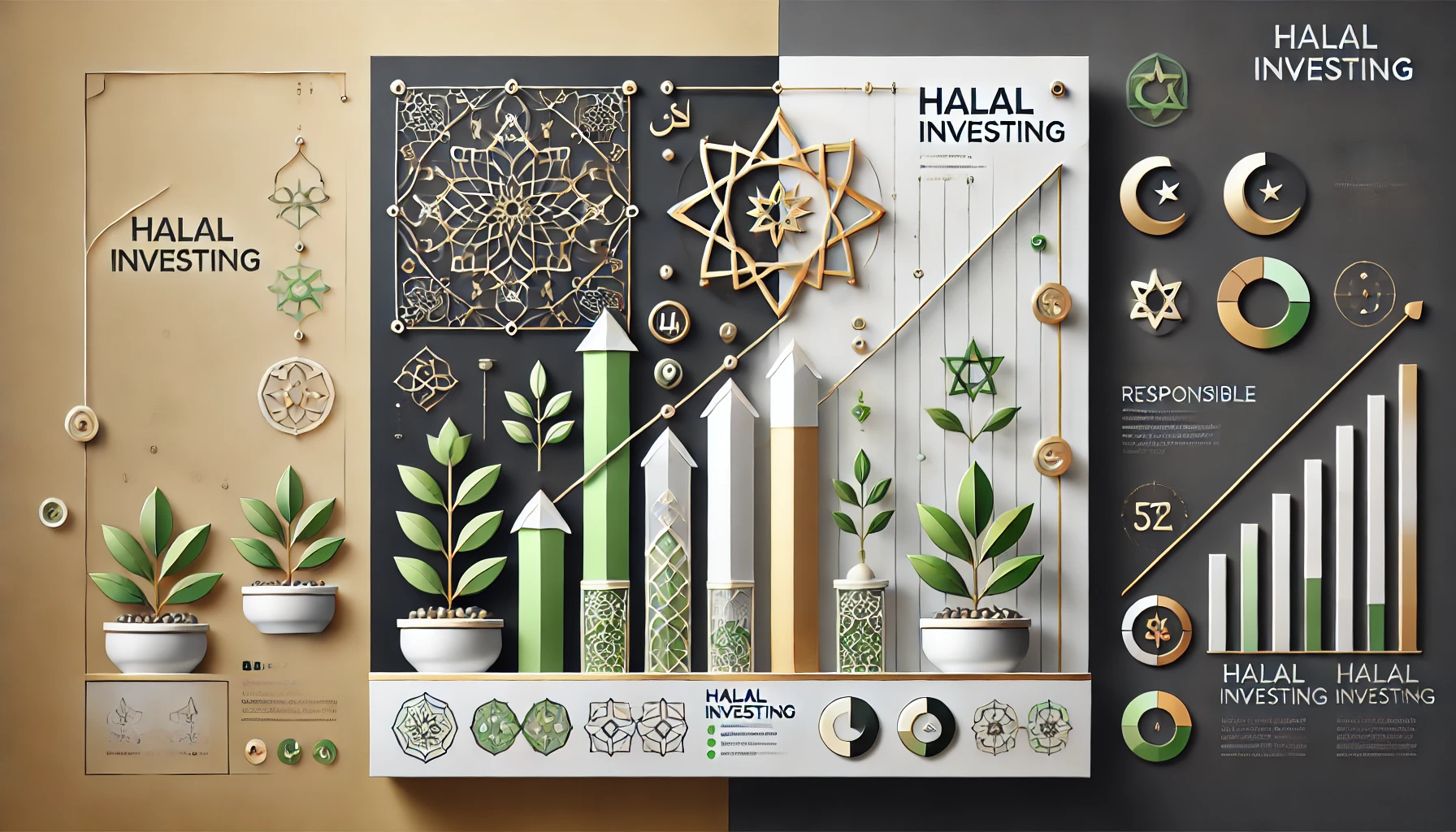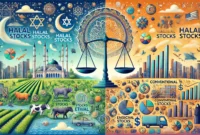In an era where global investors are increasingly seeking financial returns without compromising their values, the spotlight is now on halal stocks.
These are Shariah-compliant stocks that align with the ethical and spiritual tenets of Islam—free from riba (interest), gambling, and unethical business activities.
But here’s the twist: halal investing isn’t just for Muslims anymore.
With the rising demand for ethical, impactful, and socially responsible investing, halal stocks are fast becoming the next frontier of global ethical finance.
This article explores why halal stocks are the future of ethical investing, backed by data, trends, and Islamic finance principles—making it an essential read for faith-driven investors, sustainability enthusiasts, and finance professionals alike.
The Rise of Halal Investing in the Global Market
1. The Global Growth of Islamic Finance
Islamic finance is no longer a niche. According to the Islamic Finance Development Report 2023, global Islamic financial assets reached $4.2 trillion, and this is projected to surpass $5.9 trillion by 2027.
At the heart of this growth are Shariah-compliant investment vehicles—including halal equity funds, sukuk, and Islamic ETFs.
Among these, halal stocks have captured major attention, driven by both Muslim investors and a wider audience seeking riba-free, ethical options.
2. Millennials & Gen Z Are Driving Change
Younger generations are redefining investing. According to a 2022 Pew Research survey, over 73% of Muslim millennials prefer halal investing options—and they’re not alone.
Even non-Muslims are flocking to faith-aligned investments that avoid industries like alcohol, gambling, tobacco, and arms.
This growing demand has paved the way for the rise of Shariah ETFs, halal stock screeners, and Shariah-compliant robo-advisors globally.
Read Too : Financial Success with Faith: Top Halal Stocks for Muslim Investors

What Makes a Stock Halal?
1. Industry Filters: What to Avoid
To be considered halal, a company must not earn income from:
- Interest-based banking or insurance (riba)
- Gambling, betting, or lottery (maysir)
- Alcohol, tobacco, pork-related products
- Adult entertainment or immoral content
- Weapons or arms trade
This aligns closely with ESG (Environmental, Social, and Governance) standards—but with stricter moral filters.
2. Financial Ratio Screening (AAOIFI Standards)
Organizations like AAOIFI (Accounting and Auditing Organization for Islamic Financial Institutions) have set global halal stock screening standards. These include:
- Interest-bearing debt < 33% of total assets
- Interest income < 5% of total revenue
- Liquidity ratio and leverage considerations
These filters help identify riba-free stocks and companies that engage in interest-free investing.
3. Purification of Non-Compliant Income
Even when a stock passes the halal stock screening, there might be minor non-compliant income (e.g., interest earned on deposits).
In such cases, zakat on shares or purification by donation is encouraged to cleanse the profit.
Why Halal Stocks Are a Game Changer in Ethical Investing
1. Faith-Driven, Yet Financially Competitive
Contrary to misconceptions, Shariah-compliant stocks are not “low-return” or “limiting”.
In fact, indices like the Dow Jones Islamic Market Index and MSCI Islamic Index have often outperformed their conventional counterparts, particularly in volatile markets due to their lower debt exposure and ethical business models.
Example: During the 2008 financial crisis, Shariah-compliant indices were less impacted due to their avoidance of high-leverage financial firms.
Read Too : Beginner’s Guide to Investing in Halal Stocks: Grow Wealth the Right Way
2. Built-In Risk Management
By filtering out highly leveraged companies and volatile industries like gambling and speculative tech, halal portfolios tend to be more resilient and conservative, attracting investors who prioritize capital preservation.
3. Values + Transparency = Long-Term Trust
Halal equity funds and Islamic capital markets offer transparency, moral clarity, and a long-term outlook—values highly sought after in today’s uncertain financial climate.
This resonates with investors beyond religious lines, including ESG-focused and impact investing communities.
Halal Stocks vs Sukuk: Which One Is Right for You?
| Feature | Halal Stocks | Sukuk (Islamic Bonds) |
|---|---|---|
| Ownership | Partial ownership in a company | Ownership in an asset or project |
| Risk Level | Higher (equity market volatility) | Lower (fixed returns, asset-backed) |
| Return Type | Dividends & capital gains | Fixed periodic payments |
| Liquidity | High | Medium (depends on market) |
| Investor Suitability | Long-term growth seekers | Conservative, income-focused investors |
| Shariah Screening Required | Yes | Yes |
For younger, growth-oriented investors, halal blue chip stocks and emerging halal penny stocks can offer exciting opportunities.
For those seeking stability, sukuk is a safer option.
Read Too : Top Halal Stocks to Invest in for Ethical Returns
Halal Investing as a Global Ethical Alternative
1. Beyond the Muslim Market
Countries like the UK, USA, Malaysia, and the UAE have launched Shariah-compliant investment platforms catering to both Muslims and ethically-minded investors.
Notable platforms and indexes:
- Wahed Invest (Shariah-compliant robo-advisor)
- Zoya App (halal stock screening)
- Dow Jones Islamic Market Index
- MSCI Islamic Index
2. Alignment with ESG and Sustainability
Interestingly, many halal stocks overlap with ESG-compliant stocks, especially in industries like clean energy, technology, and healthcare.
The ethical investing movement and Islamic finance are now walking parallel paths—with increasing intersection.
Common Misconceptions About Halal Stocks
“Halal investing is just for Muslims.”
False. Anyone can invest in halal stocks.
The principles align with universal ethics—like avoiding harmful industries and speculative assets.
“Halal stocks have lower returns.”
Not necessarily. In many cases, their performance is on par or even better than conventional stocks due to better risk management.
“It’s hard to find halal stocks.”
Not anymore. Tools like Zoya, Islamicly, and platforms like Wahed and ShariaPortfolio make halal investing easier than ever.
Tips to Start Your Halal Investment Journey
- Use a Halal Stock Screener
Tools like Zoya, Islamicly, or IdealRatings help you verify stock compliance. - Choose a Halal Stock Broker
Look for brokers offering Shariah-compliant ETFs and halal portfolios—such as Wahed, Iman Fund, or Amana Mutual Funds. - Diversify Your Portfolio
Mix halal blue chip stocks, sukuk, and Shariah-compliant ETFs to manage risk. - Understand Zakat Obligations
Learn how to calculate zakat on shares to fulfill religious obligations.
Conclusion
As the financial world seeks integrity, transparency, and sustainability, halal stocks stand out as a powerful solution.
Rooted in faith but aligned with universal ethics, they offer investors a way to grow wealth without compromising moral values.
Whether you’re a Muslim investor seeking Shariah compliance or a global citizen looking for ethical growth opportunities, halal investing provides a proven, principled path forward.
With increasing digital accessibility, robust screening tools, and strong global demand, it’s clear: halal stocks are not just a trend—they’re the future of ethical investing.
FAQ
What are halal stocks?
Halal stocks are Shariah-compliant shares of companies that operate in line with Islamic principles—excluding industries like alcohol, gambling, and interest-based finance.
How can I screen stocks for halal compliance?
Use halal stock screening tools such as Zoya, Islamicly, or consult the AAOIFI financial ratio guidelines.
Is halal investing profitable?
Yes. Many halal portfolios and Shariah-compliant indexes have shown competitive or superior returns, particularly in volatile markets.
Can non-Muslims invest in halal stocks?
Absolutely. Halal investing is open to everyone and appeals to those seeking ethical and responsible investments.
Are halal stocks part of the ESG trend?
Yes. Halal investing shares core values with ESG investing, such as ethical screening, sustainability, and transparency.




